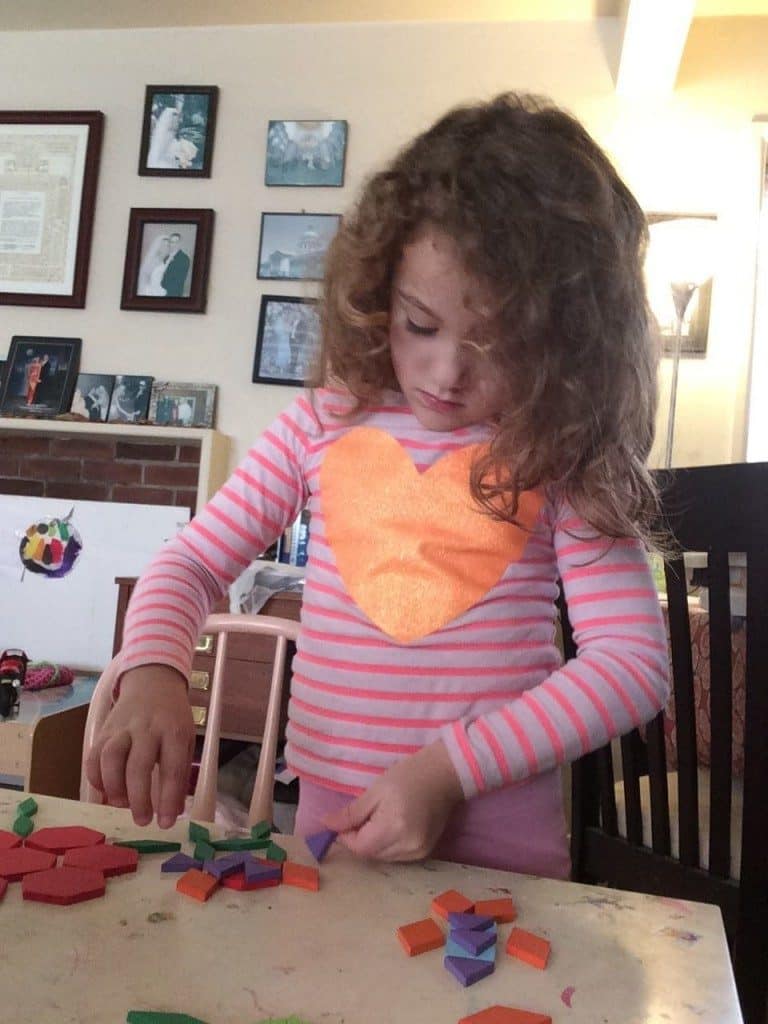
This post is an excerpt from our e-book, The 5 Habits of Highly Successful Homeschoolers >>
Habit 2: Brainstorm a Blank Page

“In theory, theory and practice are the same. In practice, they are not.”
—Albert Einstein
 Teacher or Parent?
Teacher or Parent?
One of the unnecessary complications that homeschooling parents too often take on themselves is that they try to shoulder the dual role of nurturing parent and “traditional” teacher – rather than just the more natural, wholistic approach of expanding their role as a parent who teaches.
Ponder on that. How can expanding your role as a Teaching Parent (and dismissing the inclination to try to be a stereotypical “teacher”) help improve learning, but also relationships, harmony, and happiness in your home?
The Blank Page Mentoring process can help you do this, and reap the benefits of true homeschool, as opposed to school-at-home.
Build the Strengths
One thing to keep in mind as you do this is to put special emphasis on the gifts, talents, interests and passions of your child or children. Review your list and make sure that at least 3 out of 5 entries are the ways in which you are planning to support your child in following his or her passions.
If you detect that most of what you’ve listed is designed to address a “weakness” or “deficit”, consider what that means: How do you feel when someone points out your weaknesses, and offers a plan to “fix” you? (Usually, kind of crummy!) Is that the feeling you want to instill and have your child associate with learning? Is that the model and culture of “homeschool” you want to establish? We’re guessing (hoping…) that the answer to these questions is, “No!”
 Strength and Joy
Strength and Joy
Building from strengths rather than poking at weaknesses can be a hard transition for many parents to make, mentally and emotionally; but in fact, it’s WAY more effective to build strengths and focus on the love of learning. In this way, the child supplies the majority of the interest, effort and motivation; we become guides, facilitators and cheerleaders. So much more positive for everyone involved!
And as the children learn to own their role as self-educators, as they build their skills and knowledge in the things they love, it will naturally lift their skills and knowledge in the things that are less “fun” for them.
As they mature and get a sense of purpose for their education and future, they will have the ability and will to work out whatever inevitable gaps still exist in their preparation. This is a natural process in Scholar Phase, and is an organic outgrowth of a solid Core and active Love of Learning.
No matter how diligent the teacher, no matter how talented or motivated the child, there is no way to ever cover everything in the years before adulthood, right?
So every education is a matter of choices, and picking your battles.
When you, as a mentor, choose the most inspiring and empowering approach, week after week, year after year, your child will discover his or her genius and unleash it on the world!
The Big 3: Socialization, Math, Keeping Up with the Joneses
 Weekly brainstorming for each child also helps you easily and quickly overcome the 3 biggest questions people tend to have about homeschooling. The 3 questions are:
Weekly brainstorming for each child also helps you easily and quickly overcome the 3 biggest questions people tend to have about homeschooling. The 3 questions are:
- What about their social development?
- What about math (or writing, or music, or science, or …)?
- What will people think?
These are simple to fix in the weekly brainstorm. If Johnny needs help socially, write it down as one of this week’s needs. Write it every week that it feels like a priority. Then brainstorm real solutions. Maybe you get him into a choir, a chess club, or well-considered play dates with friends. Maybe starting a YSS group would help, or some other form of socializing activity that he could really enjoy.
If these things won’t really help him, consider what will. Or, reconsider your priorities, and why you have it on the list. Are you trying to make Johnny more like Mikey? Or trying to impress the Johnsons? Are you trying to completely change his nature? (PLEASE: Spare yourself this futile, frustrating and soul-destroying agenda….) Is his style actually just fine? Is it your attitude that needs to change? Are you responding to the voices of negativity or naysayers that don’t really serve you?
Sometimes, that is the surprising answer. Still, if he really does need help, and you’re approaching it in a loving, empowering way, Blank Page Mentoring can really help you pinpoint what matters most and how to do your part in it.
 Brainstorm what will help, and give it a try. If it doesn’t work, brainstorm again and again; you’ll get a lot of things right. If you keep at this, his socialization can become a huge strength.
Brainstorm what will help, and give it a try. If it doesn’t work, brainstorm again and again; you’ll get a lot of things right. If you keep at this, his socialization can become a huge strength.
In truth, this is the best way to overcome any educational challenge—whatever Johnny faces. Brainstorm what he needs, and brainstorm what part you should take in helping him fill his need.
- Should you back off and let him own it more?
- Take him to meet someone who excels in the thing he’s interested in?
- Make a more serious effort in your own projects to model the ethic of refining your talents?
Keep brainstorming and implementing your plans until he gets what he needs and really excels.
If he needs better math learning, brainstorm needs and solutions. Maybe he needs a math mentor to show him how amazing and exciting math is; maybe an online or local class to help him learn some basic skills; maybe an app to learn algebra (you can play at it, too!), or…the sky really is the limit. Brainstorm until you figure it out, and keep planning until you get a plan that truly exceeds your expectations.
Sadly, some people get worried when they read things like this that maybe Johnny needs them to learn algebra with him. If a parent is scared of algebra, or any other topic, this is understandable. But this shouldn’t worry you at all. You can do it. Or if you can’t, you can find help from someone. Brainstorm until you find a solution.
 Keep brainstorming until you find a plan that truly works. Habit 2 is so powerful!
Keep brainstorming until you find a plan that truly works. Habit 2 is so powerful!
If you are worried about what people might think about your family homeschooling, brainstorm solutions. Maybe you shouldn’t care quite so much what other people think. Or maybe you need to change how you talk about things. Maybe you could role-play with your kids on how to respond to the curious questions of extended family members or new acquaintances. Or maybe … the brainstorm will tell you what is needed, and what to do.
If needed (and this should definitely happen sometimes!), write your own name at the top of a page, and brainstorm your needs. Then brainstorm solutions. And keep doing this until a plan truly succeeds.
It’s okay to try several things that don’t work. A lot of things will succeed, and that’s your focus. If some things don’t work out, that’s okay. Smile, chalk them up to experience, and brainstorm something else. The mere process of asking these questions – even if all the answers aren’t easy, useful, or readily forthcoming – will dramatically improve your mentoring mojo.
Whatever the concern, use Habit 2. It works. It works much better than any other method.
Take Your Homeschool to a Whole New Level
 Imagine what would happen to the quality of our public schools if every teacher would sit down every week and brainstorm: What does Johnny need right now? What can I do this week to offer support and/or help fill this need?
Imagine what would happen to the quality of our public schools if every teacher would sit down every week and brainstorm: What does Johnny need right now? What can I do this week to offer support and/or help fill this need?
What if every teacher did this every week for every child and youth, and then set out to help the child or youth meet his or her needs?
Answer: Learning would blossom. Excellence would appear in every classroom.
This is great education. This is what education should be!
While this might not be possible in every school, it is certainly possible in your homeschool. Your child deserves a truly superb, great education. And you can give it to him. Just aim for greatness, and brainstorm every week about what your child or youth needs and how you can help her get it.
Then do your part to help her fill these needs. When you do this, great education is the natural result.
What is it Worth to YOu?
 Habit 2 takes less than an hour a week, but it will take your homeschool to a whole new level of quality, excellence and greatness. Or, if you have a larger family, take one day off from schooling and spend it specifically doing brainstorms for every one of your children.
Habit 2 takes less than an hour a week, but it will take your homeschool to a whole new level of quality, excellence and greatness. Or, if you have a larger family, take one day off from schooling and spend it specifically doing brainstorms for every one of your children.
The children can read whatever they want during this day, or do whatever learning projects they choose. Or you can give them assignments. But even if they did nothing on this one day a week, the fact of you getting clear on each child’s needs and effective plans to fulfill them would mean that they’ll learn so much more this week—and every week—than otherwise.
They’ll learn so much more than other students without such personalized teacher attention.
Implement Habit 2, and you’ll see them blossom in every meaningful way, and their learning will skyrocket. Add it to Habit 1, and you’ll see your children come alive with a greater sense of who they are, and a deeper love of learning.
These 2 Habits are simple, even easy, but they will make a drastic difference. They will hugely improve your homeschool. Do them! And have fun doing them, because thinking about greatness and brainstorming how to help your kids is a lot of fun if you relax and enjoy it.
This is great teaching. This is great parenting. It leads to great education! So get started, and have fun at it. Get out a blank page and a pen, and write a name at the top. If you run into major roadblocks, write your own name at the top and brainstorm what you need. Then brainstorm ways to deliver your needs.
Then do them!

“It is about discovering our higher purpose in life.
I wanted so badly to discover that for myself.
Why was I really here?
What was it that I was really put on this earth to do?”
—Joseph Jaworski
That’s an exerpt from Habit 2 of the 5 Habits of Highly Successful Homeschoolers. Watch for more in coming weeks!
































Leave A Comment